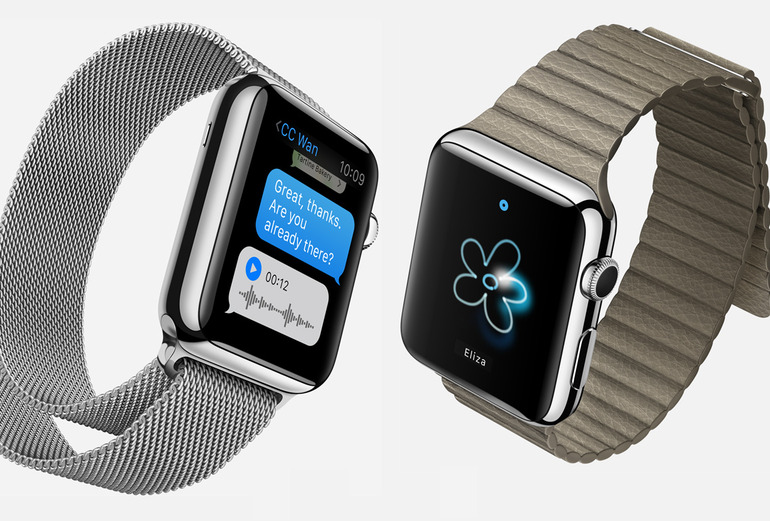No, The Apple Watch Won't Give You Cancer
Earlier this week, the New York Times published an exceptionally bizarre and fear-mongering article that originally ran with the following hyperbolic title, "Could wearable computers be as harmful as cigarettes?" Penned by Nick Bilton, the article clumsily attempts to insinuate that we might want to be a bit wary about the impending wave of wearables because devices like the Apple Watch might, just maybe... cause cancer.
Ugh.
DON'T MISS: This sleek metal bumper is easily my favorite iPhone 6 case right now
We have long suspected that cellphones, which give off low levels of radiation, could lead to brain tumors, cancer, disturbed blood rhythms and other health problems if held too close to the body for extended periods.
Yet here we are in 2015, with companies like Apple and Samsung encouraging us to buy gadgets that we should attach to our bodies all day long.
Though Bilton concedes that there has been no research on the effects electronic wearables has on users, he attempts to conjure up cause for concern by drawing a flimsy parallel between wearables and some of the research that has been done into the casual link between cell phone usage and cancer.
Compounding matters is that Bilton uses Dr. Joseph Mercola as one of his key sources. Mercola is an interesting guy, to say the least. A practitioner of alternative medicine, he believes vaccinations are dangerous and was once ordered by the FDA to stop making illegal claims about products he was hocking to naive consumers. Suffice it to say, if a publication as venerable as The New York Times is going to come out with an ominous report about wearables, using Mercola as a source in any capacity is completely backwards.
Needless to say, the Internet erupted once Bilton's piece hit the web.
Popular Science was quick to get things started:
Geoffrey Kabat, a professor of epidemiology at the Albert Einstein College of Medicine, said that Bilton appeared to be carefully cherry-picking studies that showed what he wanted to. "What struck me about this article was that Bilton went to exactly the worst of the studies," he says. "If you read the best overviews by the most competent people, you'd come away saying that there's no consistent signal that cell phones are causing brain cancer."
The Verge also chimed in with a scathing piece calling out the numerous holes in Bilton's piece.
What follows is a spectacularly ungenerous reading of the scientific literature. Bilton quotes a single qualified physician before moving on to an osteopathic physician named Dr. Joseph Mercola who "focuses on alternative medicine." Mercola has been outspoken on the link between cell phones and cancer, occasionally as a guest on the Dr. Oz show, and has a lucrative side business selling homeopathic products on his website, Mercola.com. He has been the subject of four separate letters from the FDA for mislabeling products or promising health benefits that are not supported by the medical literature. The fact that he's being quoted as a health expert by The New York Times is astounding, as some have already noted.
Almost comically, Mercola just so happens to sell products which he claims will "reduce your brain's exposure to cell phone radiation." How delightfully and profitably convenient.
Taking a step back from issues surrounding Mercola's credibility, The Verge astutely points out that the connection between cancer and cell phone usage has never been a link scientists have been able to draw. Indeed, there is literally no direct evidence which suggests as much. What's more, the very same 2011 World Health Organization study Bilton cites in his article found no statistically relevant link between the two.
Underscoring the degree to which Bilton's piece is all sorts of wrong, New York Times public editor Margaret Sullivan went so far as to address all of the criticisms directed at the paper for running such a poorly supported feature.
Though Bilton reportedly defended his piece, the Times ever so slightly acknowledged that it had messed up.
And although Mr. Bilton is a columnist, with plenty of leeway for expressing opinion, the careful interpretation of facts still matters. That, too, was lacking.
What's more, the original web headline felt like click bait, although it certainly reflected the top of the column. Toning it down was a smart move — in fact, a necessity. That change happened after Times Science staff members saw the first headline online and objected, Mr. Emmrich told me.
The column clearly needed much more vetting, at least some of which could have been done internally at The Times. The topic itself is a worthy one, and I don't object to its appearing in Styles; placement isn't the issue. But sophisticated evaluation of serious research surely is.
So, no – the Apple Watch won't cause cancer. And no, the Apple Watch, or any wearable for that mater, is not as harmful as cigarettes. And while we're at it, your iPhone won't cause cancer either.
